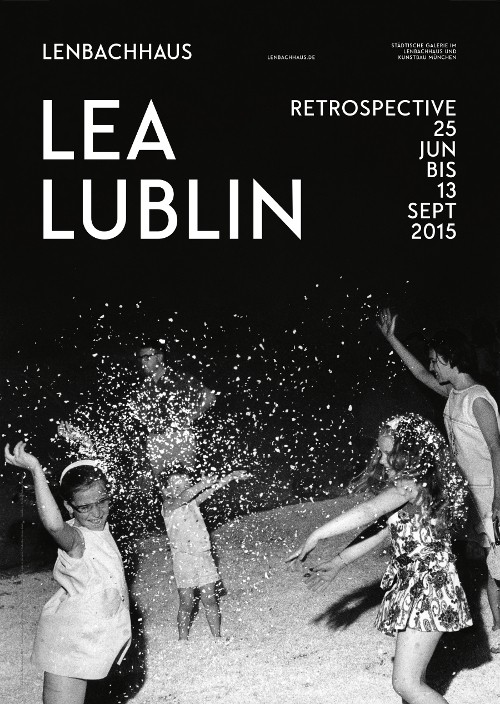Lea Lublin
25 Jun - 13 Sep 2015

Exhibition poster
Lea Lublin, Fluvio Subtunal, 1969, Environment, Santa Fe (Argentinien)
Photo: unknown
Courtesy Estate of the artist/ Collection Nicolas Lublin
Lea Lublin, Fluvio Subtunal, 1969, Environment, Santa Fe (Argentinien)
Photo: unknown
Courtesy Estate of the artist/ Collection Nicolas Lublin
LEA LUBLIN
Retrospective
25 June — 13 September 2015
Lenbachhaus presents the first retrospective exhibition dedicated to Argentine-French artist Lea Lublin (1929 Brest, Poland – 1999 Paris). Having begun her career as a painter in Buenos Aires, Lublin radically changed course in the mid-1960s to create art that would offer the greatest possible agency and participation for its audience. Lublin belonged to a generation of such artists as Lygia Clark and Allan Kaprow, committed to overcoming the boundaries separating ‘art and life’. Seeking dialogue and confrontation, Lublin’s approach was at once sensual and didactic, challenging yet egalitarian. Her work closely engaged with currents in critical theory, philosophy, and art of her time, and brings them alive for us today. Though familiar to her artistic peers and a younger generation of scholars in France and Argentina, Lublin’s work is still largely unfamiliar to a broader international audience.
Spanning three decades, the exhibition at Lenbachhaus focuses on several essential chapters in the artist’s trajectory: the abandonment of painting in favour of environments and actions, the use of dialogue as an art form, the deconstruction of art historical imagery from a psychoanalytical and feminist standpoint, and the inquiry into Marcel Duchamp’s sojourn in Buenos Aires. In addition to photographs, drawings, wall installations, and videos, the exhibition will feature a reconstruction of Lublin’s most ambitious environment “Fluvio Subtunal“ (1969).
On the occasion of the exhibition, Lenbachhaus has restored and preserved a large body of key works from the artist’s estate. Many works are on view for the first time in 20 years. International loans from The Museum of Modern Art in New York, the Centre national des arts plastiques, the Fonds régional d’art contemporain Alsace, and the Bibliothèque nationale de France complete the presentation.
Curated by Stephanie Weber
Exhibition architecture: Marina Correia, Rio de Janeiro
Exhibition graphics: Doris Würgert, Munich
PUBLICATION
A copiously illustrated catalogue with contributions by Stephanie Weber, Thibault Boulvain, Catherine Francblin, Teresa Riccardi, Monika Bayer-Wermuth, Isabel Plante und Pierre Restany accompanies the exhibition. The catalogue brings together Lublin's most important texts in their original languages as well as, for the first time, in English and German.
Stephanie Weber, Matthias Mühling (eds.): Lea Lublin – Retrospective, Snoeck, 354 pp., 150 ills.
Retrospective
25 June — 13 September 2015
Lenbachhaus presents the first retrospective exhibition dedicated to Argentine-French artist Lea Lublin (1929 Brest, Poland – 1999 Paris). Having begun her career as a painter in Buenos Aires, Lublin radically changed course in the mid-1960s to create art that would offer the greatest possible agency and participation for its audience. Lublin belonged to a generation of such artists as Lygia Clark and Allan Kaprow, committed to overcoming the boundaries separating ‘art and life’. Seeking dialogue and confrontation, Lublin’s approach was at once sensual and didactic, challenging yet egalitarian. Her work closely engaged with currents in critical theory, philosophy, and art of her time, and brings them alive for us today. Though familiar to her artistic peers and a younger generation of scholars in France and Argentina, Lublin’s work is still largely unfamiliar to a broader international audience.
Spanning three decades, the exhibition at Lenbachhaus focuses on several essential chapters in the artist’s trajectory: the abandonment of painting in favour of environments and actions, the use of dialogue as an art form, the deconstruction of art historical imagery from a psychoanalytical and feminist standpoint, and the inquiry into Marcel Duchamp’s sojourn in Buenos Aires. In addition to photographs, drawings, wall installations, and videos, the exhibition will feature a reconstruction of Lublin’s most ambitious environment “Fluvio Subtunal“ (1969).
On the occasion of the exhibition, Lenbachhaus has restored and preserved a large body of key works from the artist’s estate. Many works are on view for the first time in 20 years. International loans from The Museum of Modern Art in New York, the Centre national des arts plastiques, the Fonds régional d’art contemporain Alsace, and the Bibliothèque nationale de France complete the presentation.
Curated by Stephanie Weber
Exhibition architecture: Marina Correia, Rio de Janeiro
Exhibition graphics: Doris Würgert, Munich
PUBLICATION
A copiously illustrated catalogue with contributions by Stephanie Weber, Thibault Boulvain, Catherine Francblin, Teresa Riccardi, Monika Bayer-Wermuth, Isabel Plante und Pierre Restany accompanies the exhibition. The catalogue brings together Lublin's most important texts in their original languages as well as, for the first time, in English and German.
Stephanie Weber, Matthias Mühling (eds.): Lea Lublin – Retrospective, Snoeck, 354 pp., 150 ills.
